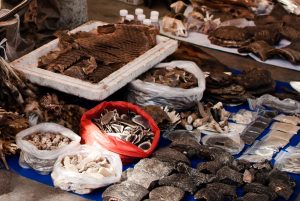The COVID-19 pandemic has offered Southeast Asian nations a rare and narrowing window of opportunity to clamp down on the region’s endangered wildlife trade, after the business saw a sharp contraction due to the COVID-19 pandemic, according to a report from the United Nations.
In recent decades, Southeast Asia has become a source, conduit, and market for a wide range of endangered wildlife products, from ivory and tiger skins to bear bile, pangolin scales, and rhino horn. The trade is a by-product of the region’s post-Cold War regional economic integration, both between Southeast Asian nations and between Southeast Asian nations and China, where a large emerging middle-class has created a booming demand for rare and exotic meats and other wildlife products.
According an internal report prepared by the U.N. Office on Drugs and Crime (UNODC) for regional law enforcement agencies, and quoted in this recent report from Reuters, the COVID-19 pandemic has prompted a sharp drop in the trade of illegal wildlife products in Southeast Asia.
This is reflected in the United States Agency for International Development’s Counter Wildlife Trafficking Digest, released in May, which showed that the number and volumes of seizures of key wildlife products had fallen by as much as half. According to the digest, seizures of pangolin parts in China, Laos, Vietnam, and Thailand dropped from 82 incidents in 2019 to 48 incidents in 2020, while the total volume of seizures fell sharply from 155,795 kilograms of pangolin products in 2019 to just 9,765 kilograms last year. The USAID digest also registered decreases in the number and quantity of tiger and elephant products seized in these countries.
The main reason for the drop was the disruption in traffickers’ networks that came as countries shut their borders, instituted lockdowns, and tightened surveillance. The link between the emergence of COVID-19 and the wildlife trade has also prompted some governments to tighten or impose restrictions on the trade, in part or in whole, of wildlife products.
In early 2020, as COVID-19 was beginning its fatal global migration, the Chinese government banned the consumption of wild meat and other wildlife products, and ramped up its prosecutions of wildlife crimes. Meanwhile, Vietnam stepped up enforcement of its on-the-book anti-trafficking laws in July of last year. The link between the coronavirus and wildlife markets also prompted a slump in demand for endangered products.
The illegal wildlife trade didn’t entirely disappear; as this June 2021 report from Mongabay notes, like many industries, traffickers adapted to COVID-19 by shifting their operations online. “Advertisements and trade continue to proliferate on social media platforms, and there is evidence that traders may be resorting to stockpiling animal parts in anticipation of demand recovering as restrictions are eased,” it reported.
Indeed, according to Reuters, the UNODC conducted interviews with wildlife traders and traffickers in remote parts of the borderland between Myanmar, Thailand, Laos, and China. Here it found evidence that wildlife products were being stockpiled until restrictions slacken. A similar conclusion was also reached by an investigation conducted by the Environmental Investigation Agency and the Wildlife Justice Commission in Vietnam.
All this suggests that the wildlife business could spring back sharply as the region moves toward widespread vaccine coverage and begins to loosen COVID-19 travel and movement restrictions.
According to UNODC, the drop in illegal wildlife trade has offered a rare opportunity for the region’s governments to prevent the return of the industry once border controls are relaxed, by strengthening enforcement collaboration and improving the content and implementation of wildlife laws.
However, such a route is strewn with numerous obstacles. Much of the regional illegal wildlife trade takes place in remote regions of Myanmar, Thailand, and Laos – the so-called Golden Triangle – that has rarely if ever been under effective central state control. The situation in Myanmar, which has spiraled into crisis since the military coup in February, has only entrenched the political economy of conflict and blurred state jurisdictions in which traffickers of narcotics and wildlife have long flourished.
Given the many other challenges facing Southeast Asian nations as they seek a recovery from the economic fallout from COVID-19, there is every likelihood that as “legitimate” economic activities pick up, they will drag illicit markets along with them.

































